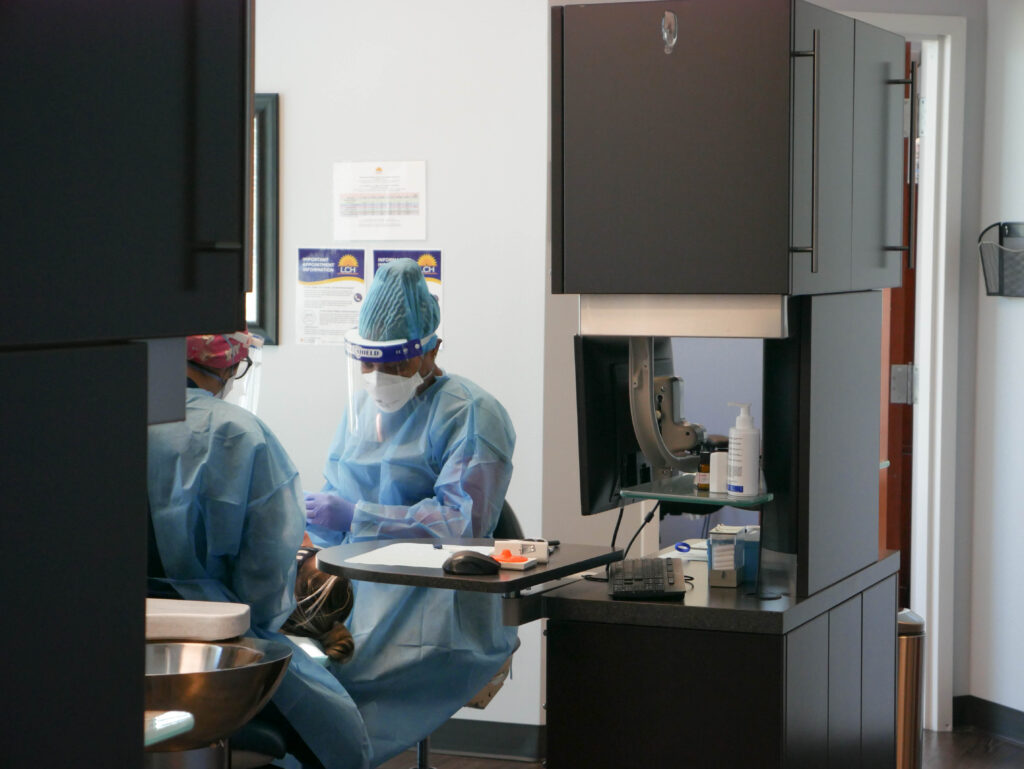August 16
Beyond the Teeth: How Dental Health Impacts Your Whole Body
The Importance of Dental Care for Your Overall Health

Caring for your teeth and gums is about so much more than just your oral health. In fact, your oral health has a significant impact on the rest of your body.
The Importance of Dental Care for Your Overall Health
As the gateway to our digestive tract and respiratory system, the mouth is often referred to as the window into the rest of our body. This is because the mouth does not just provide access to our stomach and lungs, but the soft tissue of our gums also provides exposure to our bloodstream.
When teeth and gums are healthy, that bloodstream is well protected from the bacteria and germs that hang out in our mouths. When they are not healthy, people tend to be more susceptible to other problems. This is just one of many reasons why the importance of oral health is so vital to your overall health.
The Link Between Oral Health and Systemic Health
The relationship between oral health and systemic disease has become an interesting topic of study in modern medicine. The high correlation between dental or gum disease and more serious health problems has generated enough curiosity for researchers to look for more concrete connections and causes.
As it turns out, the mouth is a major point of defense against harmful disease and infection. When that defense is weakened by poor oral hygiene, bacteria infiltrates the body and wreaks havoc. These health problems further weaken the mouth’s protective abilities, creating a negative cycle of oral and systemic disease.
Just a few of the common diseases and conditions that have been studied in relation to oral health include:
- Cardiovascular disease – gum disease, called periodontitis, is associated with a higher risk of diseases that cause inflammation, narrowing, and blocking of the blood vessels. Researchers believe that harmful bacteria has easy access to the bloodstream through the weakened tissue in diseased gums, resulting in serious problems like heart attack and stroke.
- Diabetes – uncontrolled high blood sugar causes problems all over the body, and the mouth is no exception. Individuals with diabetes have a harder time fighting infections, so they tend to be at higher risk of gingivitis and periodontitis. The subsequent oral pain and tooth loss make it more difficult to keep a diet that promotes better blood sugar, which makes overall diabetes management less successful.
- Respiratory infections – when gum disease is present, the harmful bacteria buildup in the mouth can be inhaled into the lungs. Individuals with gum disease and an otherwise weaker immune system due to age or chronic illness are more susceptible to pneumonia and other respiratory infections.
- Pregnancy complications – when bacteria enters the bloodstream of a pregnant woman with periodontitis, it can also make its way to the developing baby and cause problems. The most common pregnancy complications associated with oral health are low birth weight and premature delivery.
Protecting and caring for your mouth provides a strong defense against many serious health problems. That is why it is so important to understand the importance of proper dental care.
The Role of Oral Hygiene in Preventing Disease
The daily habits required for maintaining great oral health and a strong line of defense are incredibly simple. By following a routine of brushing, flossing, and rinsing, you can prevent gum disease, cavities, tooth loss, and many of the more severe health risks associated with poor oral hygiene.
Brush your teeth twice a day for two minutes using a fluoride toothpaste and a soft toothbrush. This practice removes plaque, which is the sticky film of residue that builds up from food and drink.
Floss your teeth once a day to remove plaque from between the teeth and near the gum line. Concentrate on flossing the space between the teeth; be careful not to cut into your gum flesh.
Rinse once a day with an oral rinse, usually called mouthwash, to go the extra step in clearing out any plaque and bacteria that brushing and flossing may have missed.
In addition to maintaining these care habits, you can enhance your oral health with good dietary and lifestyle choices:
- Drink plenty of water as your main beverage every day
- Limit sugary foods, candy, and foods that get stuck in your teeth
- Avoid smoking and chewing tobacco products
Oral hygiene is not complicated, but it is one of the best ways to avoid costly and painful problems in your mouth and the rest of your body. If brushing and flossing are not current daily habits, consider setting a reminder on your phone or a note on your bathroom mirror. Even if you have already experienced some level of gum or tooth disease, getting into the habit of practicing good oral hygiene now will significantly improve your health.
The Impact of Oral Health on Psychological Well-Being
Your oral health affects more than your physical health. What’s happening in your mouth has a big impact on your psychological health as well. Your mouth is an important part of your image, so it’s only natural that it’s also an important part of how you feel about yourself.
Poor oral health is associated with the following mental health concerns:
- Self-esteem and Confidence – if you are worried about how your teeth look or that your breath smells bad, you are less likely to smile or talk to people. This leads to low self-esteem, withdrawal from social activity, and loneliness.
- Negative Body Image – the low self-esteem mentioned above is pervasive. When you don’t think people will like your smile, it’s easy to internalize that and not believe that any part of you is attractive.
- Anxiety and Depression – between the actual pain of poor oral health, fear of judgment, and poor self-perception, it’s easy to see how one can experience anxiety and depression.
We usually view ourselves far more harshly than others. Most people are not nearly as judgmental about imperfect teeth as we think they might be. But the feelings associated with damaged or missing teeth and gum disease are real. Keeping up with an oral hygiene routine is just as good for our mental well-being as it is for our general health.
The Importance of Regular Dental Check-ups
In addition to the daily habits of brushing, flossing, and rinsing, dental check-ups are integral to the importance of oral health. Everyone should get a dental check-up twice per year. At this appointment, the dental hygienist will do a thorough cleaning to get rid of any plaque buildup that persists even with the best daily routine. The dentist will take a look at your gum health and check for cavities.
Some people are too embarrassed to go to the dentist because they have neglected their teeth. Although a cleaning after a long time of skipped visits will be uncomfortable, it will make for a better starting point to set new habits. Others are afraid to go to the dentist due to anticipated pain or the need for dental procedures. The truth is that avoiding a check-up can create a much more painful or invasive procedure later, so it’s better to stay up to date and address issues as they occur.
Still others believe that if they have good dental habits and no pain, they don’t need to see a dentist. But regular check-ups are necessary for preventing dental decay and gum disease, since the dentist can identify problems right when they start and take corrective action. So even if everything looks and feels good, it’s important to go the extra step and schedule those regular appointments. Regular check-ups and preventative care will help you avoid costly and painful procedures in the future.
The Role of Dentists in Overall Health Management
Dentists are aware of the importance of oral health as it relates to systemic health. They are on the front lines of identifying vulnerabilities that could grow into bigger health problems if left untreated. Procedures like cavity fillings and root canals are meant to stop bacteria and infection from digging further into the gum, bone, and bloodstream.
When gum disease is present along with cardiovascular problems, diabetes, or other systemic diseases, the dentist is a key member of the healthcare team that works to help individuals recover their health. Dentists have the advantage of being able to chart immediate visual evidence of health and disease, while other healthcare providers need to rely on various lab tests. This means that they can provide valuable insight when collaborating with other providers.
When it comes to overall healthcare, seeing the dentist for regular check-ups can often make the difference in preventing serious systemic disease. More importantly, following the dentist’s guidance on the importance of proper dental care and maintenance can empower you to take better control of your physical health.
Prioritize Dental Care for a Healthier Future
To maintain complete health, put your oral health first. Practice good daily habits of brushing, flossing, and rinsing, and never skip that bi-annual dental check-up. Make sure to take time at those check-ups to review your habits, ask questions, and mention any pain or sensitivity you’re experiencing. Your dental professionals are your partners in long-term oral health.
The LCH Dental Center of West Grove provides accessible and affordable dental care for all ages. With a focus on preventative care and patient education, we help each patient take proactive care of their teeth and gums. Please contact us at 610-444-7550 to make an appointment for your or your child’s dental cleaning and exam.

